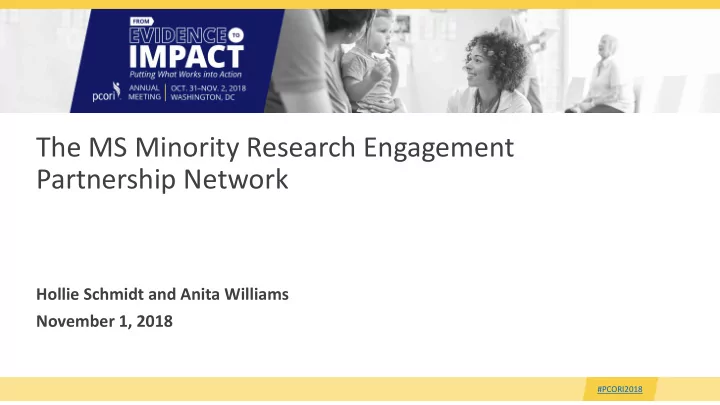

The MS Minority Research Engagement Partnership Network Hollie Schmidt and Anita Williams November 1, 2018 #PCORI2018
Disclosures Hollie Schmidt • Biogen (unpaid advisory committee membership) Anita Williams • Nothing to disclose 2 • November 21, 2018
Objectives We hope to enable you to: • Identify the barriers and facilitators affecting minority engagement in research • Discuss the benefits of including multiple stakeholder types when addressing research engagement challenges • Adapt the outreach methods and materials used in this project to meet other engagement challenges 3 • November 21, 2018
About Multiple Sclerosis • MS is a disease of the central nervous system • It is the most common disabling neurological disease among young adults • It affects people of all races and ethnicities in all regions of the world 4 • November 21, 2018
Minorities are missing in MS research Recent RRMS clinical trial Recent PPMS clinical trial 5 • November 21, 2018
Why does it matter? • We can’t apply results of studies to populations that weren’t represented • No hope of personalized medicine for minorities with MS without greater inclusion and participation • We have an incomplete picture of MS if everyone isn’t included • For instance, what causes MS may be different from group to group • Research priorities won’t reflect topics that matter to everyone • Lack of inclusion and participation means lack of engagement; lack of engagement leads to lack of a voice in decision-making 6 • November 21, 2018
Our approach to addressing this problem With funding from a PCORI Engagement Award: • Form a multi-stakeholder network to combine knowledge and assets • Understand the barriers and facilitators affecting minority engagement in MS research • Conduct outreach activities aimed at promoting minority research recruitment and participation 7 • November 21, 2018
Understanding the problem • Literature review • Original research • Internet-based survey of 2600 people with MS • See lay language report at bit.ly/msresall • Community events (Atlanta and LA) • Conversations with clinicians and researchers 8 • November 21, 2018
Barriers to MS minority research engagement Mistrust, fear, concerns Lack of information Healthcare site People with MS Time pressures Cultural norms Lack of awareness about research studies Concern about losing patients to research site Clinicians Researchers Cost and time pressures Anticipation of rejection Lack of translation resources Exclusion criteria / comorbidities 9 • November 21, 2018
Facilitators of MS minority research engagement Access to treatment and information Benefits to community People with MS Ability to offer new options to their patients Contributing to the evidence base for MS minority healthcare Clinicians Researchers Funder/regulatory requirements/expectations Ability to answer more questions 10 • November 21, 2018
Outreach efforts • Partner and professional toolkits • Conference posters and presentations • Journal manuscript for survey results • Postcards for partner events • NMSS African-American conferences • Community events – planting a seed 11 • November 21, 2018
Results, reflections, learnings • Strength in diversity: Multi-stakeholder network approach led to greater learning, greater impact • Flexible project design allowed for responsiveness to findings and ideas • Expansion of survey, addition of manuscript • Recognition of pivotal roles of researchers and clinicians; addition of professionals toolkit • Reduced emphasis on social media; removed MS Sunday event • Engagement and communication challenges • Only one face-to-face meeting; monthly conference calls • Inconsistent awareness of goals and status 12 • November 21, 2018
Identified needs and next steps • New needs identified: • Absence of (and desire for) organized communities and channels around MS in minority groups • Need for more research focused on people with MS in minority groups • Need for education addressing misconceptions about research • Next steps: • Hold “Mythbusters” webinars and live events • Identify highest-priority research topics for MS minority communities • Work within iConquerMS and with other research initiatives to address these high-priority topics 13 • November 21, 2018
Learn More • www.pcori.org • info@pcori.org • #PCORI2018 • msminorityresearch@acceleratedcure.org • www.acceleratedcure.org/MinorityNetwork 14 • November 21, 2018
Acknowledgements • Minority Health Associations • People with MS/Project Advisors • MANA – Amy Hinojosa • Shawn Feliciano • National Black Nurses Association – Erica • Anita Williams Davis • MS Researchers/Clinicians • National Hispanic Medical Association – • Lilyana Amezcua Minerva Campos • National Minority Quality Forum – Laura • Mitzi Williams Lee Hall • Daniela Pimentel Maldonado • Pharma/Biotech • MS Advocacy Organizations • Biogen – Terrie Livingston • Accelerated Cure Project – Hollie Schmidt • Genentech – Daniel Machemer and • MS Association of America – Gina Murdoch Damian Fiore • National MS Society – • Strategy/Public Health and Science Deb Frankel and Coleen Friedman Communications • Feinstein Kean Healthcare – Monique LaRocque and Melissa Glim 15 • November 21, 2018
Thank You! Hollie Schmidt VP of Scientific Operations, Accelerated Cure Project Anita Williams Advocate and MREPN Project Advisor 16 • November 21, 2018
Recommend
More recommend